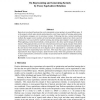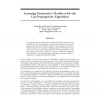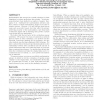104 search results - page 19 / 21 » Iterative Subgraph Mining for Principal Component Analysis |
JMLR
2006
13 years 7 months ago
2006
Kernels are two-placed functions that can be interpreted as inner products in some Hilbert space. It is this property which makes kernels predestinated to carry linear models of l...
KDD
2003
ACM
14 years 8 months ago
2003
ACM
To analyze the effect of the oceans and atmosphere on land climate, Earth Scientists have developed climate indices, which are time series that summarize the behavior of selected ...
NIPS
1997
13 years 9 months ago
1997
Up-propagation is an algorithm for inverting and learning neural network generative models. Sensory input is processed by inverting a model that generates patterns from hidden var...
SIGMOD
2005
ACM
14 years 7 months ago
2005
ACM
Randomization has emerged as a useful technique for data disguising in privacy-preserving data mining. Its privacy properties have been studied in a number of papers. Kargupta et ...
DEBU
2008
13 years 7 months ago
2008
The open nature of collaborative recommender systems allows attackers who inject biased profile data to have a significant impact on the recommendations produced. Standard memory-...



